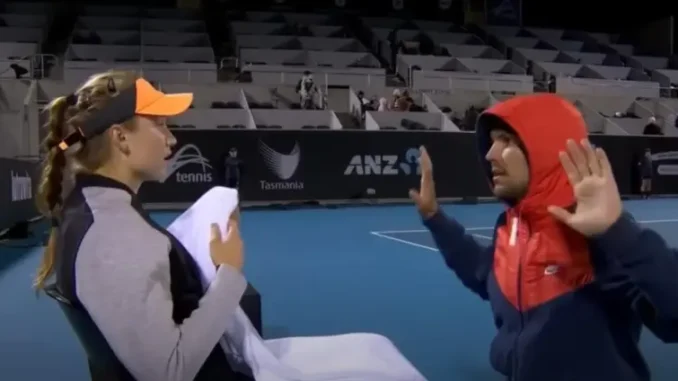
Stefano Vukov, the prominent tennis coach known for his intense and passionate approach to guiding his players, is at the center of attention as reports surface about how players have described him before a recent WTA investigation. The insights into Vukov’s coaching style, shared by an insider familiar with the tennis circuit, paint a picture of a figure who elicits strong opinions—both positive and critical—depending on the perspective of those who have worked with him.
The revelations come at a time when the Women’s Tennis Association (WTA) is paying closer attention to the dynamics between players and their coaches, aiming to ensure a positive and supportive environment within the sport. Vukov, who has achieved significant success as a coach, including leading top-ranked players to notable victories, has been characterized by some as a highly driven and demanding mentor. For others, however, his methods have occasionally crossed into controversial territory, raising questions about the balance between tough love and crossing professional boundaries.
Vukov’s Coaching Philosophy
Vukov has built a reputation for his intense commitment to his players’ success. Known for his hands-on approach, he is often seen courtside, offering detailed tactical advice and pushing his players to exceed their limits. Many admire his dedication and see his methods as a key factor in the success of the athletes he coaches. Under his guidance, several players have reached new heights in their careers, a testament to his ability to hone talent and instill a competitive mindset.
However, this uncompromising drive for excellence can also lead to friction. According to the insider, some players have described Vukov as “demanding to the point of being overbearing,” noting that his high expectations can sometimes verge on creating a pressurized environment. While this approach may work for certain athletes who thrive under such intensity, it has reportedly left others feeling overwhelmed or undervalued.
Mixed Reactions from Players
The insider’s account reveals a spectrum of experiences among players who have worked with Vukov. Some view him as a transformational coach whose tough methods are a necessary part of achieving greatness. “He pushes you hard, but that’s what it takes to succeed at the highest level,” one player reportedly said. These athletes credit Vukov with instilling discipline, focus, and resilience, qualities that have propelled them to significant achievements in their careers.
On the other hand, there are those who feel that his approach can sometimes be too harsh or unsupportive, particularly in moments when empathy and encouragement are needed. “It’s not just about tactics and drills,” another player is said to have remarked. “Sometimes, you need a coach who understands the mental and emotional side of the game.” This sentiment underscores the delicate balance that coaches must strike between challenging their players and providing a nurturing environment.
The WTA’s Growing Focus on Player-Coach Dynamics
The WTA’s investigation into the broader dynamics between players and their coaches comes in the wake of increasing scrutiny on how relationships in professional sports are managed. The organization has emphasized the importance of maintaining a healthy and respectful atmosphere, recognizing that the mental well-being of players is as crucial as their physical and tactical preparation.
Vukov’s case is particularly noteworthy given his profile in the tennis world and the contrasting views players have expressed about him. While no formal accusations have been made against him, the attention surrounding his coaching style highlights the ongoing dialogue within the sport about what constitutes effective and ethical coaching.
A Broader Conversation in Tennis
The discussion about Vukov’s methods reflects a larger trend in tennis and other professional sports, where the relationship between coaches and athletes is evolving. Historically, the “tough love” approach was widely accepted, with many believing that intense coaching was essential to producing champions. However, as the understanding of mental health and well-being has grown, there is increasing recognition that coaching styles must adapt to meet the diverse needs of athletes.
Players today are more vocal about their experiences, and organizations like the WTA are taking steps to ensure their voices are heard. This shift has led to a re-examination of what constitutes an effective coaching relationship, emphasizing collaboration, communication, and mutual respect.
Vukov’s Response and Future
For his part, Vukov has remained committed to his coaching philosophy, emphasizing that his methods are driven by a desire to bring out the best in his players. He has previously stated that his approach is tailored to the needs of each athlete, aiming to push them to their full potential while respecting their individuality. As the WTA continues its investigation and the conversation about coaching dynamics evolves, it remains to be seen how Vukov’s methods will be perceived within the broader context of professional tennis.
In the meantime, his supporters point to his track record as evidence of his effectiveness, while his critics urge a more balanced approach that takes into account the emotional and psychological demands placed on players. Regardless of the outcome, the discussion surrounding Vukov highlights the complexities of coaching at the highest levels of sport, where the line between pushing for greatness and maintaining a supportive environment can sometimes blur.
Conclusion
The insights shared by the insider offer a glimpse into the multifaceted world of professional tennis coaching, where personalities like Stefano Vukov play a pivotal role in shaping the careers of top athletes. As the sport continues to evolve and prioritize the holistic well-being of its players, the debate over coaching styles is likely to remain a central topic. For now, Vukov’s story serves as a reminder of the challenges and responsibilities faced by those who guide the stars of the game, balancing the pursuit of excellence with the need for compassion and understanding.
Leave a Reply